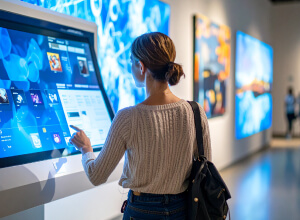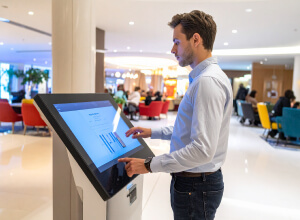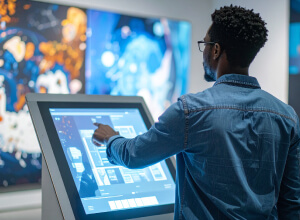Looking Back at 2020, Looking Forward to 2021

Were our 2020 predictions immune from the virus? And where do we see digital signage going in 2021? Read to find out.
If ever there was a year designed to trash predictions, it was 2020. The global pandemic, a once in a multi-generational lifetime event, seemed honed by natural selection to target not just humans but the business of digital signage. How much evolution can one expect for the place-based digital content industry when no one is leaving their home!
As it turns out, perhaps quite a bit. It was as much about changing attitudes as it was about changing technology, and the repercussions will be deeply felt by the industry in 2021. But we'll get to that in a moment. Let's start with a look at our predictions from last year.
- The physical space gets its due within the customer journey
Bridging web and mobile experiences with the in-store experience was informed by biology to wait a moment and then put on hold - for months. Curfews, capacity limits, and flat-out closures led to struggles to generate any foot traffic at all. This year was more about survival than omni-channel. - Prospects and clients will demand enterprise-ready platforms
The "enterprisation" of digital signage platforms has absolutely progressed, though at a slower rate than anticipated. Intuiface remains the only ISO 27001 certified platform, while there have been a couple SOC 2certifications in North America. On the other hand, with the increase in remote work and a general concern about macroeconomic conditions, scrutiny of data security and integrity has grown tremendously. The modularization of digital experience platforms does have wind at its back so we expect the drive towards platform maturation to continue. - Accelerated no-code/low-code evolution of signage platforms
Seems this is a higher hurdle than we anticipated. There are countless examples of no-code/low-code developments for knowledge workers - e.g. see Airtable -but the signage industry as a whole continues to depend on HTML5 coding for anything beyond broadcast signage. With the exception of Intuiface, of course…..
Our prediction accuracy? If we grade on a COVID curve, we did about as well as we could have hoped.
Ok, let's look ahead at 2021 and see where we think the events of the past year will take us.
- Re-embrace of touch as the primary interaction option
Remember hearing death knells for touch-first content, the idea that cleanliness trumps convenience and all hands-on interaction would become a historical footnote? Never mind. Frankly, we never thought touch would disappear so consider this a double-down on an earlier prediction. Touch is far too convenient and familiar. It’s also quite controllable, which brings us to our next prediction. - Increased deployment of self-service kiosks
Originally considered a woeful burden, the carrying and use of hand sanitizer has become commonplace. Outside of breath, touch is our primary interface with the world, and a few-second wiping regimen now gives us comfort. The same can’t be said about face-to-face interaction, with or without masks. Self-service kiosks will no longer just be line busters, they’ll be a means for enforcing social distance in a socially acceptable way. - Growing scrutiny on energy consumption
A side effect of curfews, capacity limits, mandated closures, and self-isolation is a greater level of communion with and awareness of the natural world around us. It’s an emotional reinforcement feeding the ongoing “green-ification” of technology, which includes digital signage. One tributary of this energy-aware focus is the creation and deployment of low-powered devices that don’t sacrifice performance. Platforms will be increasingly judged on their ability to do more with less. - Placement of digital signage at the table of enterprise marketing
An increasing dependency on self-service will place a greater burden on place-based digital communication to influence and shape the customer journey. As a result, there will be greater pressure than ever before to ensure digital signage is connected to the web and mobile efforts driven by enterprise marketing teams. These pieces should be deeply connected, providing a continuum of consistent experience that may start at home but is carried completely through to the physical space.





